-
Jazz Age by Mark Tiedemann
This long novella is set in a future where humans have been in contact with an alien race called the Trishti for about 50 years. These aliens tell of a huge galaxy with plenty of other peaceful aliens. But humans must develop their own stardrive first to join this galactic community, while the Trishti are helping in small ways.
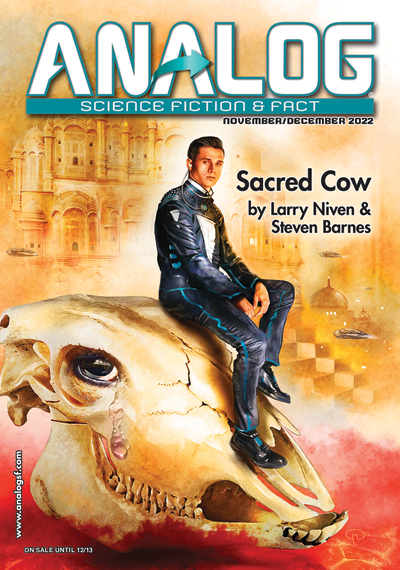
The author paints a peaceful and prosperous future in this scenario, where humans have adapted a lot of Trishti culture like naming their children inspired by Trishti names. Most people seem to like the aliens, but a few are also skeptical because humans have now become so dependent on them.
The plot gets going when the leader of the Omicron-project, the project that is working on the stardrive, declares they have succeeded. The Trishti then announce that their work here is done and starts to leave. However - the project is nowhere near finished and it was all a lie that somehow should have deceived the Trishti into revealing more of their secrets. This sets several things in motion with a political and diplomatic scandal as people try to convince the Trishti to stay. But the aliens may also have their own secrets that turns things around.
This story has plenty of good elements for an interesting thriller with mysterious aliens, political intrigue and deceitful plot treads. It is slow going though and the story is too long. It presents some interesting glimpes of how society has changed with 50 years of influence from the aliens, but it isn’t used for that much in the story. Also, most of the plot development is driven by people keeping various secrets and only reveal them when the story needs it. It is not my favorite way of storytelling, but the plot twists are interesting in their own right. Throughout the story there are a few mentions of the Trishtis music, which I assume explains the title of the story, but it was never really clear to me why that element should be so important - other than being something intriguing about them.
Read in Analog November/December 2022
Rating: 3 -
Omnilingual by H. Beam Piper
This is one of the all time classic stories of science fiction in my opinion. It also has all the elements that got me reading science fiction in the first place - ancient alien civilizations and scientists doing proper deductive reasoning.
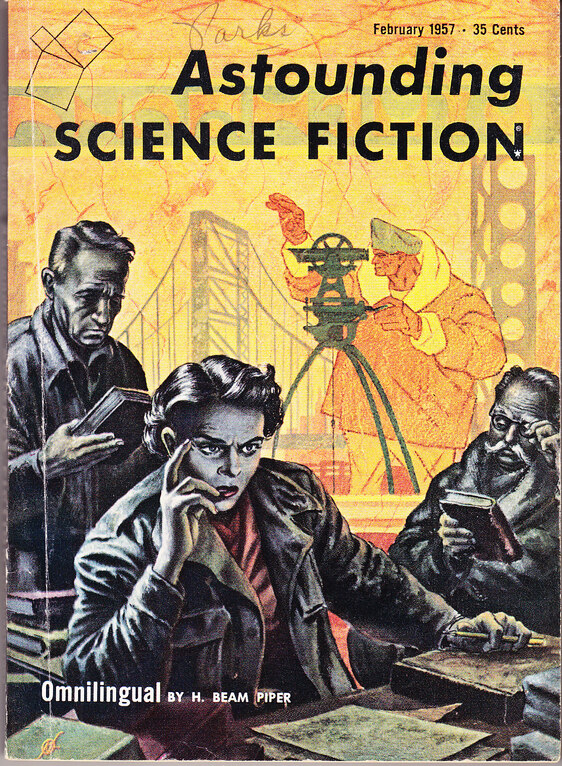
Humans have discovered ancient ruins on Mars of a now extinct advanced civilization. They find buildings, machinery and books, but no remains of the martians. The story focuses on Martha Dane who desperately tries to decipher the martian texts, but without any sort of primer or Rosetta stone she makes little progress. Her coworkers are not making it any easier by demanding that she drops her research because they deem it impossible.
This is one of those classic science fiction stories that isn’t just “good for its time” or “important for the genre”, but a genuinely great story to read today. In my opinion, scientists and their research process are too often portrayed in an either dumbed down or overly dramatized manner. This is one of the great exceptions that makes the whole process believable and engaging. That the main protagonist is a woman isn’t something you think much about today, but I would assume for its time it was a bit out of the ordinary. Just another plus point for this story. Haven’t been many great female characters in the anthology The World Turned Upside Down so far.
Read in The World Turned Upside Down
Originally published in Astounding, February 1957
ISFDB Link
Read the story at gutenberg.org
Rating: 5 -
What Would You Pay For A Second Chance? by Chris Kulp
This debut story published in Galaxy’s Edge is a decent space opera type story about a human mind uploaded into a machine.
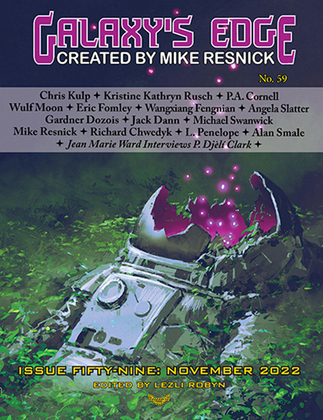
The story follow Susan who is working in an environment with lots of radiation and she has been diagnosed with a cancer she cannot afford the cure for. She does has the option of continue to “live” with her mind uploaded to a military robot. To continue her existence she must do well in the war. All her actions are rewarded or penalized with a point system and she will be terminated if her point score goes too low - or buy upgrades with enough points earned. On her very first mission she will need to think outside the box to survive.
I like how the story is straight to the point and just throws the reader and the protagonist right into a tough situation. The downside is that we barely get any character development, so even though it is easy to sympathize with Susans situation, it doesn’t have much weight and I didn’t really cared much what happened to her. It is easy to see the story as an allegory for the healthcare system in the US with its unequal access to proper treatment, and I am fine with stories with a message, but this story only manages to scratch the surface of the rather big science fiction theme on mind upload and getting a second life in an artificial body. Still, it is a decent debut story.
Read in Galaxy’s Edge November 2022
Rating: 2 -
Turning Point by Poul Anderson
This story from 1963 lives up to its title and is an interesting read in the context of also showing a turning point in how science fiction writers wrote about humans and aliens.
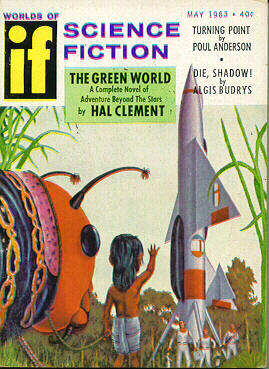
A human space exploration team discovers an Earth-like planet with human-like intelligent species. Their level of technology is around the stone age, but they quickly establish communication and the natives to the planet turns out to be very quick learners. Like extremely quick. Over the span of just a couple of days they go from being presented with the invention of the wheel to using it for quite advanced bandwagons. The humans, while impressed, gets somewhat scared. They see these people as a potential rival that might overtake humans in very few years and dominate the galaxy. Drastic measures, such as total genocide, are discussed but dropped again.
What I personally found interesting about this 60 year old story, is that it is built around a human mindset towards aliens that we don’t see much anymore in fiction. I grew up with stuff like Star Trek that generally has a positive and optimistic view of alien species - where the default assumption is that advanced species will be peaceful. Of course this story is not the first to challenge the view of the old pulps where humans are entitled to dominate the galaxy, this anthology also has The Aliens by Murray Leinster from 1959, but it is a good example of the shift in how aliens, and more to the point - how humans viewed other species, was portrayed in science fiction at the time.
I found the ending to be bit rushed but liked the overall more positive tone, so definitely worth a read.
Read in The World Turned Upside Down
Original published in Worlds of If, May 1963
ISFDB Link
Read the story at drabblecast.org
Rating: 4 -
Seen by Lisa C. Herbert
The premise of this story is an advanced technology that allows scientists on Earth to see distant planets through a microscopic black hole. The details are somewhat handwavy, but we follow Kary who have been studying a fishlike alien species on a faraway exoplanet through this device. The use of the device is under tight regulation to ensure that the observed aliens are not influenced in any way. In a session Kary ignores an alert about a fault in the device and a small glimpse of light gets through to the planet. That turns out to be a big deal, because the working theory of her research group was that the fish aliens are blind since they live in complete darkness under water - but one of the observed aliens clearly reacted and saw the flash of light.

I think it is a story that starts better than it ends. The story convincingly depicts Karys moral and scientific struggle between having her whole theory blown away and that she also broke the rules. I found the ending to go a bit overboard, but I always appreciate when scientists and how they work are portrayed in a reasonable realistic manner.
Read in Analog November/December 2022
Rating: 3+ -
Hummingbird, Resting on Honeysuckles by Yang Wanqing
Clarkesworld have published a lot of translated Chinese stories in recent years. Many of them have dealt with death in different ways and this does too. Translated by Jay Zhang.
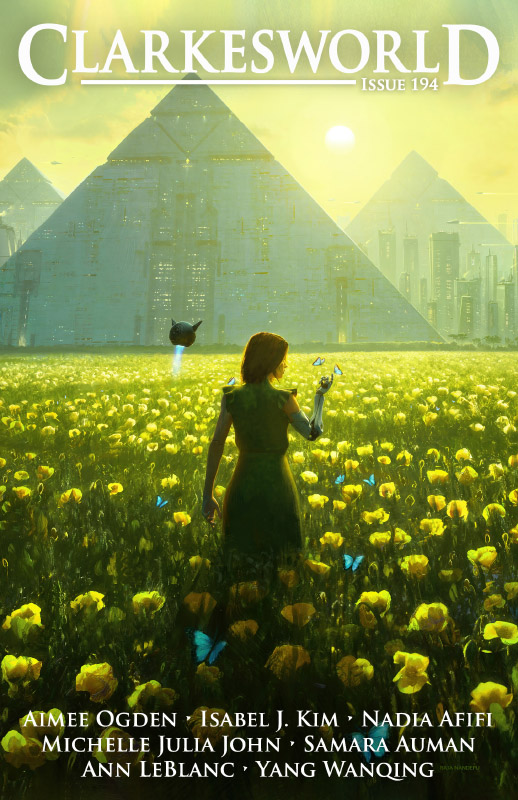
About 50 years in the future a technology exists that allows people to have their whole life recorded by a small flying drone resembling a hummingbird. The story is told by a mother who has lost her daughter to cancer at a young age. She ponders whether she should use the recordings of her daughters life to make a simulated recreation of her.
This a story that isn’t focused on plot and the structure is not straightforward with various diary like entries from the past, the mother that her addresses her deceased daughter in second person about her life, and the process of creating the simulation. None of the science fiction ideas presented here are exactly new, but they don’t need to be, because it is presented in such a way that I found emotionally engaging in a way I rarely get with these kind of “recreating the dead” type of stories. Even though the subject is tragic, it is not a sad story per se and it doesn’t become sentimental. There is a lot of celebration of the life lived by this woman and how her mother have conflicted thoughts about recording technology. In addition, even though it is a very character focused story - we also get a sense of an interesting complex future through various worldbuilding hints.
It is great to see how Clarkesworld continues to bring translated works of science fiction to a wider readership and this is one of the highly recommended ones.
Read in Clarkesworld November 2022
Rating: 4 -
Lonely Hill by James Maxey
This short story follows an older farmer named Buck living in North Carolina. He recently lost his wife and is generally not happy with life at the moment. Then a storm hits his farm and the rainfall reveals something underneath a small hill on his farm. His farm is on otherwise flat land, but since the small circular shaped hill have always been there, he hadn’t given it much thought. Underneath the now washed away dirt he finds what appears to be a crashed flying saucer. The saucer appears to be still “alive”, but weakened. With help from his UFO-enthusiastic cousin they manage to reactivate the saucer, following its “instructions” - since it appears to be able to communicate with them in some telepathic function to their subconscious.
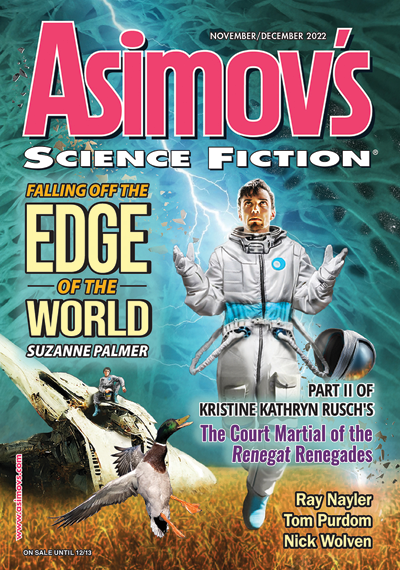
I got a very Clifford D. Simak like feeling reading this story. The characters are likeable farmers portrayed with a lot of respect, like Simak was also famous for doing. The story manages to balance and combine something lighthearted and a bit funny, while also dealing with serious issues such as loss and loneliness in an appropriate manner.
Read in Asimov’s November/December 2022
Rating: 3+ -
Forty-Eight Minutes at the Trainview Café by M. Bennardo
I tend to prefer stories with a clear setup where the world is established and there is a mostly straightforward plot. This story is one of the exceptions because the plot is minimal and we don’t get much background information about anything. Yet it has stayed in my mind for a while and clearly made an impression.

A man is living inside computer simulations and no longer has a physical body. But he has grown bored by them. He tries a new rather expensive one that on the surface is very mundane. It is basically just a short train ride. But the level of detail is so much richer than the other simulations. Everything is individually modeled and not just a generic texture. Birds are fully simulated animals and not simply basic repeated patterns. It feels more real.
It is not a story with plot-twists or big revelations, but it has a lot of atmosphere with a sense of melancholy. There are countless stories of computer uploaded minds but this captures how such simulations will likely still miss something to feel completely real. We don’t get any background information on any of the characters, but we get a very clear sense of their motivations and internal struggles with living inside computer simulations. They all seem to be missing their real physical life and will happily settle for a simulated world that has more depth than breadth in its level of details. Whatever goes on in the real world is story is not mentioned but not important. The story works very well within it its own little microcosm.
Read in Asimov’s November/December 2022
Rating: 4 -
The Last Command by Keith Laumer
This story from 1962 takes places more than 70 years after a big war. A war fought with big intelligent war machines. Now the war is almost forgotten, but some of the machines are still buried deep underground and one is awakened by nearby construction work. The intelligent machine is still operating as if the war is going and it is heading straight for the city. Now an old and retired soldier is the only one who may be able to persuade the machine to stop its mission.
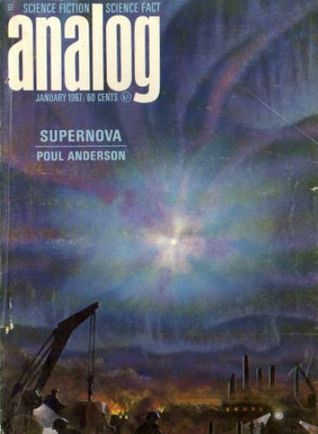
What I found most interesting about this otherwise pretty straightforward story, is how differently my reading was compared to the editors of The World Turned Upside Down. Their comments on the story focuses on its portrayal of being a war veteran and showing the sense of duty soldiers have. They even see the machines as somewhat sympathetic. My take on the story was more in the direction of being a warning against autonomous war machines. How dangerous it is to have intelligent weapons acting on their own lying around, especially after the war has ended. A concern that becomes even more relevant with the military technology of the present, where we are already seeing autonomous drones being used to some extent. That doesn’t negate what the editors say about the story though and I still found it worth reading.
Read in The World Turned Upside Down
Originally published in Analog January 1967
ISFDB Link
Rating: 3 -
When the Signal is the Noise by Rajan Khanna
Khanna gives a first contact story where the actual contact part is not that easy. A large object appears over Los Angeles and it just hovers there doing nothing. All kinds of methods at communication is attempted. Visual, sound, smell, every kind of radio transmission and nothing happens.

The story follows Monique as she gets involved with the project for her ability to find hidden connections in seemingly noisy data. When they try physical contact with the object, the people come back sick - but with very different kinds of symptoms. Monique thinks this is the key to finding the right way to communicate with the aliens.
It is a risky choice to build a first contact story around aliens that are not communicating anything at all. There is a payoff in the end explaining what is going on and I found it to be quite a good explanation for why aliens might not try communicating with anything obvious like sound, radio or visual. The problem is that the whole story is one long buildup to that point and then the story stops. The payoff is good, but not enough to justify the whole story that I felt could have been used for more.
Read in Asimov’s November/December 2022
Rating: 2+